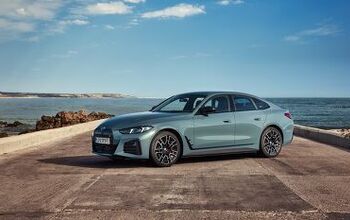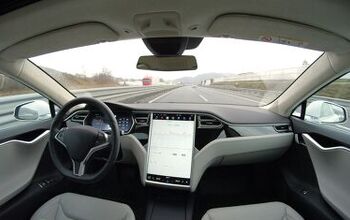Boastful Toyota Exec Feels Little Sympathy For Foolish Rivals

If only other automakers were as sensible and wise as Toyota. If those companies held Toyota’s Magic 8 Ball, conjuring up all the right answers in the little purple window, they wouldn’t be so hasty to embark on risky ventures.
That’s the view of Toyota’s executive vice president, who’s apparently feeling pretty pleased with himself and his company. Didier Leroy broke from the automaker’s staid, stay-the-course-and-don’t-ruffle-feathers attitude at the Tokyo Motor Show this week, describing his rivals’ faults at a dinner held on the show’s sidelines.
Plunge headlong into electric vehicles? Sure, make wild long-term promises to customers, Leroy said. Toyota doesn’t do that. It just hands you a real car when it’s ready. Oh, and those diesels everyone’s worried about? Toyota fell out of love with them long before the word “dieselgate” left anyone’s lips.
Toyota’s feeling its oats.
While the automaker regularly appears atop the list of the world’s largest automakers, Leroy doesn’t feel there’s much point in chasing volume just for the sake of holding the top podium. Let Volkswagen or Renault-Nissan chase the glory, he feels, as just being big doesn’t keep customers coming back.
“Toyota could buy another one, two or three companies to be the world’s No.1 automaker again, but chasing volume for the sake of being No.1 is pointless,” said Leroy, as reported by Automotive News. “Toyota had consistently sold over 10 million units a year, so we have scale. And customers buy products and brands, not a position in the automaker ranking.”
In a world where practically every automaker, save for perhaps Mazda, promises a lineup of electric vehicles (ones you’ll surely want to buy) by a randomly selected date in the tantalizingly near future, that just isn’t Toyota’s style, Leroy claims.
“When will Toyota launch its first full EV? It will come and you’ll see it when it’s ready,” Leroy said. “While other automakers circulate detailed PowerPoints of their far future product plans, we unveil a new product only when it’s ready, so our customers can buy it and our dealers can sell it.”
Note the repeated use of the word “product,” which Toyota sees as the opposite of the word “promise.” Getting sassy, Leroy then named names.
“At Toyota, we aim for profitable growth, so selling an EV and losing $10,000 per unit as Tesla does is not a sound business model in our view.”
Ouch. We expect a harshly worded rebuttal from Elon Musk any minute now, just as soon as he’s done chewing out Consumer Reports. On the topic of EV sales, Leroy said that in Europe, besides France, Norway and Germany, EV sales “are basically zero. Zero!“
As for diesels, the automaker long ago decided to stop development of its own oil-burners. Unlike most of its overseas competitors, the subcompact C-HR crossover is only offered with gasoline engines. Six years ago, Leroy said, Toyota signed a contract with BMW to supply its European lineup with diesels, rather than go it alone.
“By the way, at that time, 40 percent of our European sales were diesels, now they are 15 percent,” he said.
Automakers in as strong a position as Toyota can afford to break character once in awhile and enjoy their standing, though hubris is an ever-present danger. That seemed like the case when Toyota boasted of the upcoming 2018 Camry’s predicted sales prowess. Did the revamped sedan re-energize the declining midsize car segment like Toyota predicted? No, but the new Camry did carve out a larger chunk of that market for itself, which, to an automaker, is what really matters.
Like a washed-up celebrity was once fond of saying — winning.
[Image: Toyota]

More by Steph Willems
Latest Car Reviews
Read moreLatest Product Reviews
Read moreRecent Comments
- Rick T. "If your driving conditions include near-freezing temps for a few months of the year, seek out a set of all-seasons. But if sunshine is frequent and the spectre of 60F weather strikes fear into the hearts of your neighbourhood, all-seasons could be a great choice." So all-seasons it is, apparently!
- 1995 SC Should anyone here get a wild hair and buy this I have the 500 dollar tool you need to bleed the rear brakes if you have to crack open the ABS. Given the state you will. I love these cars (obviously) but trust me, as an owner you will be miles ahead to shell out for one that was maintained. But properly sorted these things will devour highway miles and that 4.6 will run forever and should be way less of a diva than my blown 3.8 equipped one. (and forget the NA 3.8...140HP was no match for this car).As an aside, if you drive this you will instantly realize how ergonomically bad modern cars are.These wheels look like the 17's you could get on a Fox Body Cobra R. I've always had it in the back of my mind to get a set in the right bolt pattern so I could upgrade the brakes but I just don't want to mess up the ride. If that was too much to read, from someone intamately familiar with MN-12's, skip this one. The ground effects alone make it worth a pass. They are not esecially easy to work on either.
- Macca This one definitely brings back memories - my dad was a Ford-guy through the '80s and into the '90s, and my family had two MN12 vehicles, a '93 Thunderbird LX (maroon over gray) purchased for my mom around 1995 and an '89 Cougar LS (white over red velour, digital dash) for my brother's second car acquired a year or so later. The Essex V6's 140 hp was wholly inadequate for the ~3,600 lb car, but the look of the T-Bird seemed fairly exotic at the time in a small Midwest town. This was of course pre-modern internet days and we had no idea of the Essex head gasket woes held in store for both cars.The first to grenade was my bro's Cougar, circa 1997. My dad found a crate 3.8L and a local mechanic replaced it - though the new engine never felt quite right (rough idle). I remember expecting something miraculous from the new engine and then realizing that it was substandard even when new. Shortly thereafter my dad replaced the Thunderbird for my mom and took the Cougar for a new highway commute, giving my brother the Thunderbird. Not long after, the T-Bird's 3.8L V6 also suffered from head gasket failure which spelled its demise again under my brother's ownership. The stately Cougar was sold to a family member and it suffered the same head gasket fate with about 60,000 miles on the new engine.Combine this with multiple first-gen Taurus transmission issues and a lemon '86 Aerostar and my dad's brand loyalty came to an end in the late '90s with his purchase of a fourth-gen Maxima. I saw a mid-90s Thunderbird the other day for the first time in ages and it's still a fairly handsome design. Shame the mechanicals were such a letdown.
- FreedMike It's a little rough...😄
- Rochester Always loved that wrap-around cockpit interior. The rest of this car, not so much. Between the two, it was always the mid-90's Cougar that caught my attention.


































Comments
Join the conversation
Toyota does have the benefit of operating in a post bubble home market. Hence are more directly in the market of selling product, rather than just hype and paper. And in a position to hire, and promote to positions of authority, people capable of bringing to market competitive product. Instead of people whose stock in trade is selling handbags to Wall Street welfare queens; renamed for political correctness subprime loans to people who can't afford to pay them back; and endless whines about needing regulations to protect them from competition from those who do focus on building better product.
I suppose I should update my Toyota file: Boring. Disconnected. Appliance. Sludge. No style styling. Caution: brake pedal is an overboosted on/off switch. I will probably never buy one. Maybe an FRS. Scions have nice stereos. Excess of brackets secured with 10 mm bolts. Just replace the entire transfer case every time. Smug owners. Smug company.